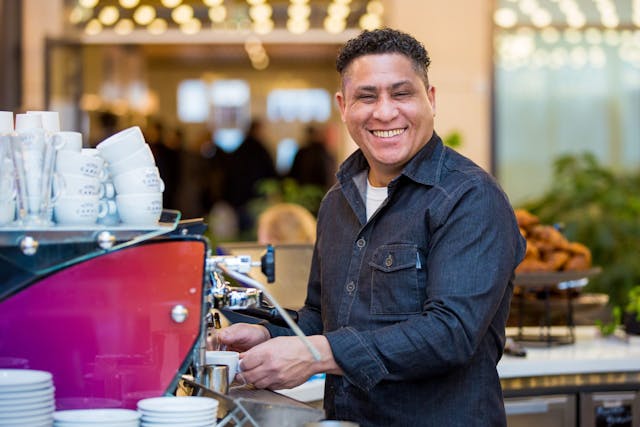Vermaat Group
The Challenge
Vermaat Group is a hospitality and catering company with 5,000 employees plus a pool of temporary workers, who are regularly deployed at one of the 500 locations and at events. The organization grew so fast that more functionalities and computational support were needed to properly organize the entire workforce planning process.
How we create value
Optimization of workforce planning, combined with an app for internal communication.
Benefits
- The workforce planning process organized into one system.
- Automatic calculation of supplements for irregular hours, violations and CLA regulations, and therefore far fewer checks to be carried out
- Much more reliable time tracking
- From a week with five or six people, to two people in two days at most for payroll processing.
- At management level, real-time insight into the number of hours worked and still to be worked per employee.
- Increase employee satisfaction through insight and social interaction by means of the app.
Industries
Facility Services

“Everyone now automatically gets what they are entitled to”
The chef in the Michelin-starred restaurant, the waitress at the anniversary party, the employee in the company cafeteria, the team in the snack bars and restaurants at the zoo: Vermaat Group schedules huge numbers of culinary professionals every day at countless locations across the Netherlands. The workforce management system helps with that, says Product Owner Workforce Planning Vanessa Mersmann: “What’s very important is that the math work is taken out of our hands. All supplements for irregular hours, violations and collective bargaining agreements are automatically passed on, so all employees automatically get what they are entitled to."
Mersmann deliberately chose her position with the Vermaat Group eight and a half years ago. The combination of systems and people has appealed to her since she studied occupational and organizational psychology. "Once I started working here, it became apparent pretty quickly that we were not doing anything with timekeeping onsite. At the time, it was done by hand, resulting in all kinds of errors. To me, the first step was to implement a timekeeping system that had recently been purchased. Organizationally, that system was a great fit for Vermaat, but after four years we found that we were growing so fast that more functionalities were required. So, in 2018, I started looking for a new workforce management system with a project team, and we decided on ORTEC.”
Inner Person
Vermaat Group is a hospitality and catering company with 5,000 employees, not to mention the temporary workers who are regularly deployed at one of the 500 locations and at events. Vermaat serves various sectors: corporate hospitality, hospitals, leisure, party service, you name it. As Mersmann says, "We do everything: from banks and tech companies to museums and theme parks, from Rabobank to Booking.com, from Artis to the Van Gogh Museum, and from LaPlace to Multi-Tenant buildings. We operate under the banner of the business concept at hand, and in addition to catering we also take care of things such as decor and furnishings. At the Rijksmuseum restaurant, we cook at star level, but we also have a production kitchen in which we prepare healthy, trendy lunches that are then delivered and served. Vermaat has the expertise that our clients do not have themselves. We don't actually compete on cost; food safety is our number 1 priority. Health plays a major role. And, of course, we have very high volume."

Vanessa Mersmann, Vermaat Group
"It was a huge operation to make employee availability transparent, but it was very important."
Central planning office
Until about seven years ago, planning was still done on an “Excel sheet,” Mersmann says. “At the end of the day, the hours that were actually worked were tracked and these numbers were typed into the ERP system for payroll payment. Now, everything is in one system. With the exception of hospital locations, where fixed schedules are more common than, say, at a Museum Square (Museumplein) location. The latter is more dependent on weather conditions and holidays. We are and need to be very diverse in terms of locations and planning. Basically, each location does its own planning. The on-site planner is often the hospitality manager, meaning they have a dual role. They know what is happening at their location, but also need to know exactly how the system works; a tough task. We also centralized a small part and now have a central planning office, gaining real prominence during the COVID-19 pandemic. Before that, it was difficult to get things going. Suddenly, hospitals had a lot of work and museums closed, so we were forced to reassign people to other locations. It was a huge operation, but a very important one, to make employee availability transparent."

Vanessa Mersmann, Vermaat Group
"Previously, five or six of us spent a week processing salaries, now we do it with two people in two days at most."
Real-time insight
The workforce management system makes timekeeping much more reliable, as Mersmann can attest. "Because those hours are registered right away. It’s of great important that the math work is taken out of our hands. All supplements for irregular hours, violations and collective bargaining agreement regulations are automatically calculated, so everyone gets what they are entitled to. It also means far fewer payroll audits. Seven years ago, five or six of us spent a week processing salaries. Now we are able to do it with two people in two days at most. It also provides insight during the scheduling period. Regional managers can check in real time to see whether their employees are getting their hours that period, or if they are working too much. We used to have a time clock at all our locations. Now, we have the ORTEC Relevance app, in which employees can specify when they started and finish work, should those times differ from the schedule. This information is then automatically available to your manager."
Trusting your employees
In practical terms alone, the app saves a great deal of investment: "We don't have to look at cabling for the time clock anymore, and there's no need for IT personnel. When we took over management of 43 La Place restaurants in 2021, we no longer had to worry about clocks. You do have to be able to rely on and trust your own staff. They can enter their own availability in the app, and swap shifts among themselves. The app is actually our own Intranet: it is very comprehensive and is used not only to gain insight into one’s own rosters, but also for social interaction. At Vermaat Group, we try to pay a great deal of attention to employee satisfaction. We regularly organize spectacular events, such as the Vermaat Festival. We are also trying to train more and more people internally. And I myself do my best to ensure that the workforce management system keeps up with what we need. I have a number of goals in the short term: to minimize management by expanding the ERP links, to use the standard functionalities optimally, to make the management information as complete as possible, and to ensure the stability and continuity of the system."

Vanessa Mersmann, Vermaat Group
"We are now participating in a pilot with ORTEC to test a simpler, web-based version of the planning tool for the sites."
Mix and match
At the time, Mersmann chose ORTEC's system in part to "unburden" the locations so that they would spend less time on scheduling and would be able to deploy their own people optimally. "I think we can still make some progress in that area. It's a pretty complex system that all our planners have to understand. And since we have an absolutely enormous number of planners, we in fact would prefer to arrange the planning even a little more centrally, perhaps starting at regional level. Eventually, we would like to move towards self-rostering so that employees can schedule their own shifts. We are now participating in a pilot with ORTEC to test a simpler, web-based version of the planning tool for the sites." We submit requests to employment agencies fairly quickly. We are now working with the People & Culture Department to determine whether there are any of our “own” people who would like to work some additional hours that we are not yet aware of. Having 5,000 employees means this aspect is fairly difficult to monitor. We hope that ORTEC can facilitate us in this as well, perhaps by linking locations and then sharing services that employees can then bid on. In that way, we want to try to mix and match across locations and make more efficient use of current staffing."